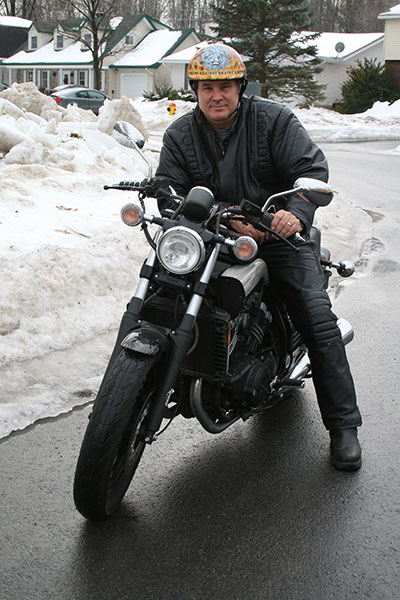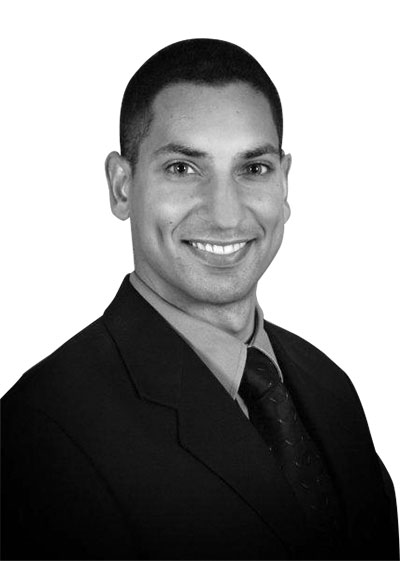
Dr. Paul Poirier has brain cancer. The Cornwall, Ont., chiropractor has undergone four surgeries.
Dr. Paul Poirier has brain cancer. The Cornwall, Ont., chiropractor has undergone four surgeries. He faced a terrible infection after one operation. He recently finished 23 months of chemotherapy, which seems to be keeping the now-inoperable tumour from growing for the time being.
 |
|
| Dr. Poirier (in black vest) with members of The Kinsmen Club of Cornwall, a huge supporter of Bikers Against Brain Cancer. With Dr. Poirier are (L-R): Walter Wheeler, Archie Van Hillier, Devan, Jody Archambault – carrying Madison Primeau, poster child for the 2013 ride – Roger Samson, Terry Muir, Jonathan Symington and Ray Eady. Advertisement
|
Yet Poirier maintains a busy chiropractic practice. He started a charity event. He even trained for a bodybuilding competition.
“I don’t feel sick most of the time,” he says. “I just don’t have as much energy as I used to – which is still more than a lot of people.”
Positive outlook, tough challenges
Every once in a while, we meet exceptional individuals – people who stay positive even when they face apparently insurmountable challenges. They don’t just cope. They thrive. Poirier is one of those people. So how does he stay upbeat and energetic despite the cancer? He prioritizes. He invests in his business. And he keeps busy – very busy.

27 Canadians are diagnosed with brain tumours each day. According to the Brain Tumour Foundation of Canada. |
Poirier’s brain cancer fight began in 1995, when he had a seizure and collapsed. This was during his final year of chiropractic study. Doctors diagnosed a mixed glioma brain tumour, which can affect speech, memory and co-ordination. Once they contract the disease, people with this condition live for just 15 years on average.
The tumour was removed, but of course, the cancer remained. Poirier steeled himself for a life with the disease. He says he took a particularly self-critical stance on the matter. Recalling the day he was diagnosed: “I had one five-minute pity party. I decided then and there to ‘suck it up, buttercup.’ There’d be nothing to gain if I festered in self-pity. I saw it as another challenge which I’d either stare down or allow to define me.”
After the surgery, Poirier went on to finish school and eventually earned his Doctor of Chiropractic degree. Knowing the tumour could return, he started practising with gusto, teaming up with experienced chiropractors in Ottawa, then in New Hampshire, seeking the best advice for developing his own practice. Eventually, he opened a business in Montreal. His career flourished.
But the damage from the tumour was apparent from time to time. Poirier would have occasional seizures and blackouts. During one such occurrence in 1997, he crashed his car into a train.
With each seizure comes memory loss, which Poirier says is frustrating. It’s usually an hour or so before he can speak again and recognize people.
Nonetheless, he maintained his positive outlook, in part by focusing on the here and now. “How do I get through it? I don’t think I’m sick. That’s number one. I go through life just like anybody else.”
If only positive thoughts alone could stop a tumour from growing. The condition reappeared full force in 2005, requiring that Poirier undergo another surgery. His recovery was a nightmare. After the operation, an infection set in, which meant surgery once more. Doctors had to remove part of his skull.
Later, Poirier underwent surgery again – his fourth – this time, to have a metal plate installed to help protect his brain.
The surgeries took a financial toll. Unable to work for nine months, his income was non-existent. Insurance helped cover some costs, but the payments were barely enough to live on.
“I lost my X-ray machine,” Poirier says. He had to sell it at a substantial loss to help cover the amount still owing on the apparatus.
Grateful he was alive, in 2008, Poirier and his wife Ginny moved to Cornwall, Poirier’s hometown, where he purchased Earthway Family Chiropractic. Before long, business was booming.
“I was on fire at that period of time,” he recalls. By advertising his services, ramping up his pace of work and investing in laser therapy equipment, he boosted the practice’s revenues by some 30 per cent.
Yet his most recent bout with cancer nagged at him, like a persistent reminder that the disease could kill him at any time. Was he doing enough with his life by prioritizing business success?
Fundraiser revs up
One day, Poirier received word that a friend’s mother had died from brain cancer. That event spurred the chiropractor and motorcycle enthusiast to establish Bikers Against Brain Cancer (bikersagainstbraincancer.org), a motorcycle ride to raise funds to fight and improve awareness of the disease.
As Poirier puts it, “Few people realize that many Canadians are affected by brain cancer.”
According to the Brain Tumour Foundation of Canada, 27 Canadians are diagnosed with brain tumours each day. The organization estimates that 55,000 Canadians have brain tumours, which count as the leading cause of solid cancer death in children and young adults under the age of 20 and the third-leading cause of solid cancer death in people aged 20 to 39. Tumours affect co-ordination, memory, thought processes and emotion. Survivors need access to specialty care and rehabilitative services.
Since 2010, Bikers Against Brain Cancer has generated more than $50,000 for the Brain Tumour Foundation of Canada and the Montreal Neurological Institute – the workplace of Poirier’s neurologist, Dr. Kevin Petrecca.
The event’s success might have something to do with Poirier’s single-mindedness. He admits the time he has devoted to promoting and organizing Bikers Against Brain Cancer is time taken away from his chiropractic practice – not that he regrets it.
“It’s more fun for me right now to be focusing on brain-cancer awareness than it is on chiropractic. I’ve been doing that for almost 20 years. It’s like anything else. After a while, it gets long in the tooth.”
But when time is short, priorities sharpen. Poirier no longer plays an active role in organizing the Bikers Against Brain Cancer rides. In 2012, he asked the Kinsmen Club of Cornwall to take over because he wanted to spend more time with his family: wife Ginny, daughter Crystal, and sons Zachary and BJ.
Poirier has taken his family to the Bahamas, Mexico and other places recently, “to show them there’s something more than Cornwall in the world.”
Poirier further honed his priorities when the tumour reappeared in 2010. This time, it was even more serious. It had migrated into the Broca’s area of his brain – the part in charge of speech – so the tumour proved practically inoperable. Surgery would render
him mute.
He underwent temozolomide chemotherapy. “It’s the same treatment Ted Kennedy used. It didn’t work for him, but I think the difference is, he was diagnosed in his late 60s. I was diagnosed in my late 20s. That 40-year gap gives you more of a chance to fight.”
Filmmaker, bodybuilder
After 23 months of chemo, Poirier returned his laser-like focus to the positive. He filmed a documentary about his fight with cancer to raise awareness about the disease. Dubbed The Test of a Man (visit drpaulpoirier.com to see the trailer), it’s narrated by Ian Anderson, lead singer of rock band Jethro Tull. Poirier says he contacted many well-known artists to find a famous narrator. Anderson said yes. He also happens to have the “rich British accent”
Poirier wanted for the film, the chiropractor says.
 |
|
| Dr. Poirier. Photo: Mai-Liis Renaud |
While working on the documentary, Poirier also trained for the International Drug Free Athletics (IDFA), a bodybuilding competition. He entered as a personal challenge, although not completely cold: he had trained in bodybuilding when he was in his teens and 20s. But this return to the gym wasn’t some grasp at past glory. Poirier viewed the training as a compelling anchor story for his documentary.
He placed third in the competition, which was his goal.
Something of a charmer, Poirier has developed relationships with a few celebrities. Anderson, the rock singer, is one, but also among Poirier’s photo collection you’ll find pictures of the chiropractor shaking hands with Arnold Schwarzenegger, spokesman for the International Chiropractic Association. The former California governor, bodybuilder and actor is also related through marriage to Ted Kennedy, who died from brain cancer in 2009.
To train for the IDFA, Poirier teamed up with none other than Ronnie Coleman, eight-time winner of the Mr. Olympia bodybuilding competition. Coleman’s favourite uncle died from cancer.
Poirier has sculpted his body, yet the tumour still cuts in occasionally. When he was training, seizures kept him out of the gym for long periods. “Each time I couldn’t do anything for about a month, because my shoulder would get all knotted up and I couldn’t touch a barbell.”
Then this past December, Poirier had a seizure at work.
“I used my face to break my fall,” he says, demonstrating his unusual sense of humour. “The downside is my office looks like a crime scene.”
No, he didn’t take the next day off. “No rest for the wicked,” he says.
Certainly no rest for Poirier, according to Jody Archambault, vice-president of the Kinsmen Club of Cornwall and past chair of Bikers Against Brain Cancer. He says Poirier habitually texts him after midnight, as if he needs to express his thoughts immediately.
“I think with his type of sickness, chances are if he doesn’t get it out, he’s worried it won’t be there in the morning,” Archambault says.
He says Poirier illustrates the importance of tenacity. “Never give up. Always push.”
Optimism and skepticism
And always look on the bright side – which explains how Poirier regards his cancer these days. He says his neurologist now questions the diagnosis doctors originally made back in 1995.
“He’s not convinced that mine is a mixed glioma,” Poirier says. “A mixed glioma is made up partially of oligodendroglioma cells as well as astrocytoma cells. The problem is astrocytoma cells are far more aggressive and should have taken me out of the game of life by now.”
He also points to a growing body of evidence that links chiropractic care and improved immunity to disease as a possible explanation. A longtime chiropractic patient himself, Poirier believes the treatment may have helped improve his body’s ability to battle the cancer.
But the line between chiropractic and improved immunity is dotted at best for now. So if his original 1995 cancer diagnosis proves correct, Poirier has no scientific explanation for his longevity. Still, as difficult as it may be to believe about someone who has done so much with his life already, Poirier thinks maybe he’s still alive because he has more work to do.
In conversations with his neurologist, “I keep telling him it’s some sort of divine intervention to do more before I cash in my chips.”
Poirier says despite the financial problems he encountered after the 2005 surgery, he isn’t especially worried that his wife and children would be financially challenged if he passed away sooner than later. Nonetheless, he expressed disappointment that Canadian chiropractors have no dedicated insurance system.
“We should have some sort of organization where we pay a certain amount each month and at the end of your career, you have so much set aside. But there’s no such thing. If there was, I’d know my wife and kids would be OK.”
Yet that isn’t his fight for now. These days, this perpetually energetic optimist focuses on what’s really important. “I’m not trying to make more and more money anymore. I’m paying my bills and enjoying what I have.”
 |
|
Stefan Dubowski is a freelance writer based in Ottawa. You can reach him at dubowski@stiffsentences.com.
Print this page